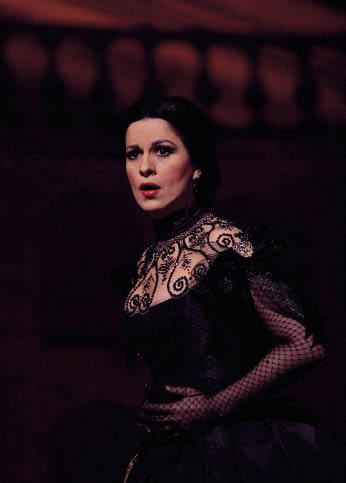La Traviata
Royal Opera House
Jette Parker Young Artists Summer Performance
Royal Opera House
The Royal Opera ended its season with yet another revival of Richard Eyre’s production of La Traviata, and the Jette Parker Young Artists Summer Performance, the latter a most interesting affair, but without much of a critical presence, presumably because it was at 1 p.m. on a Saturday. The distinctive feature of the Traviata revival was that Angela Gheorghiu returned to sing the role of Violetta, in which she had her first great international success, and which she has not sung at Covent Garden since 1996. I attended the third performance (First Capital Connect had thwarted my attempt to go to the first) and was somewhat disappointed. I had very high expectations. Despite the fact that Traviata has been served very well at the Royal Opera recently, notably by Anna Netrebko and by Ermonela Jaho, the latter a few weeks ago, I hoped for something remarkable.
Jaho’s interpretation was characterised by total immersion in the part, a major factor being her exquisite posture at key moments: she lived the role. I can’t say that Gheorghiu did. I regard her as a singer of astonishing gifts, beginning with a voice which is, in itself, affecting, in the way that Callas’s was. She is beautiful, slender, graceful, a visually and vocally convincing embodiment of several of her key roles. But there tends to be a fatal lack of passion. Her gestures are slightly contrived, she seems to live for the big moments and to be rather casual about what comes in between, which was where such great singers as Callas and Renata Scotto showed their depth of understanding. And, on this occasion at least, she was in only moderately good voice. It struck me that the volume she can routinely produce has considerably diminished, that there are fewer colours in her voice than there were, that it has become less instantly recognisable. The acrobatic demands of Act I were met, but with nothing to spare; but she made less than she can of the pathos of the scene with Germont, and all told was less engaged than I expected.
Looking over her discography, and over the times that I have seen her, I am struck by how much more often I have warmed to her in recital (for all the stinginess of the quantity she sings in one) than onstage. Also by the smallness of her repertoire, surely the tiniest of any major operatic star. She has skilfully managed to have an immense career while investigating a narrow repertoire, and I’m inclined to think that her greatest onstage success has been in La Rondine, a near-operetta that makes a virtue out of its undemanding tugging at the heartstrings. In this production Gheorghiu was rather well supported by Yves Abel in the pit, and by the plausible Alfredo of James Valenti and the more intelligent than usual Germont of Zeljko Lucic. The audience was extremely enthusiastic.
The Jette Parker performance was as interesting for the repertoire as for displaying the latest batch of young talent at the Royal Opera. The first half consisted of four key scenes from Richard Strauss: the first was the familiar Presentation of the Rose from Der Rosenkavalier, starting with Sophie’s and her snob father’s excitement and leading through the meeting of the soon-to-be lovers. The Estonian Kai Rüütel was a gorgeously creamy Octavian, the Sophie of Simona Mihai a bit too full-voiced to soar in the approved spine-tingling manner. But the whole scene was admirably convincing, considering how few props there were, and that the basic clothing was denim.
After that we had the rival poet and composer from Capriccio, the moving but still painful reconciliation from the end of Intermezzo, and the finale of Act II of Die schweigsame Frau. Enterprising. Over a period of more than 30 years Strauss’s style became ever more that of the eternal sunset, naturally concluding with the wonderful Im Abendrot (At Sunset) of the Four Last Songs. From mid-life he was seeking, in his works, conciliation, contentment, the cessation of rivalries and striving, and that is where he managed to arrive. What this excellently planned concert showed was how enjoyable some of the stops on the way were, so long as one forgets how much bustle and rodomontade there is in most of his later operas. What we saw and heard was of a high standard too, with the Royal Opera orchestra in magnificent form. Perhaps the finest of all were Eri Nakamura and Changhan Lim as Christine and Robert in the profoundly domestic Intermezzo. I look forward to hearing all these singing actors again during the forthcoming season: some of them might well upstage the major stars alongside whom they’ll be appearing.






Comments